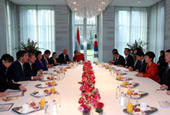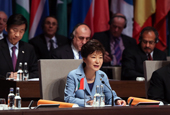During the three-way talks, the first in six years, South Korean President Park Geun-hye, U.S. President Barack Obama and Japanese Prime Minister Shinzo Abe stressed the importance of trilateral unity in dealing with the issue of North Korean nuclear armaments.
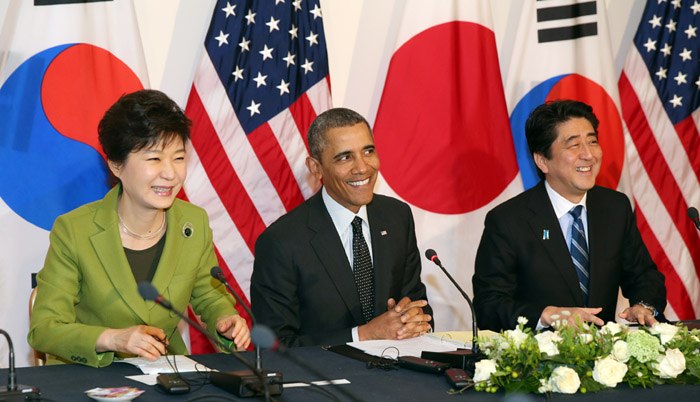
South Korean President Park Geun-hye (left), U.S. President Barack Obama and Japanese Prime Minister Shinzo Abe (right) smile during the trilateral talks on the sidelines of the 3rd Nuclear Security Summit in The Hague, Netherlands, on March 25. (photo: Yonhap News)
According to Cheong Wa Dae, the three leaders agreed that the six-party talks on Pyongyang’s nuclear arms program should re-start, not for the sake of simply talking but in order to make “substantial progress” in denuclearization. They also consented that they would continue to closely cooperate and further discuss ways to deal with the North Korean nuclear arms issue.
They agreed to urge Pyongyang to annihilate all its nuclear armament programs, including its uranium enrichment program and all its nuclear weapons, in a complete, verifiable and irreversible manner. To this end, the leaders agreed that securing Chinese cooperation is crucial to persuading the North to give up its nuclear ambitions in a constructive manner.
“Tripartite cooperation between Seoul, Washington and Tokyo has become more important than ever before, as the North increases its provocations and threats to nuclear security and enhances its nuclear capability, both quantitatively and qualitatively,” said U.S. President Obama. “We must take steps together toward denuclearizing the North in a complete, verifiable manner, and we must make the communist state realize that it will no longer get away with its wrongdoings and that any of its provocations will be met with a unified response,” he affirmed.
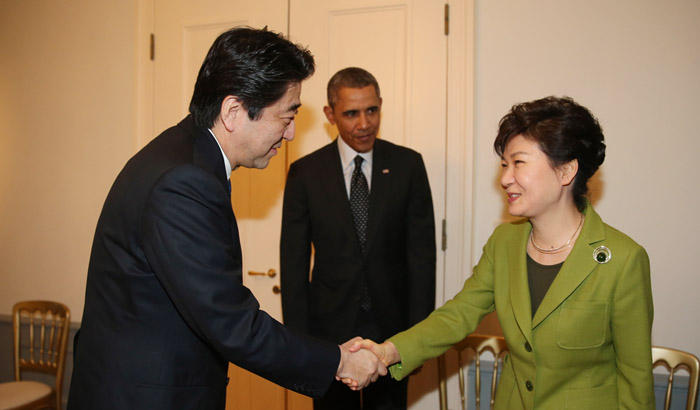
South Korean President Park Geun-hye (right) shakes hands with Japanese Prime Minister Shinzo Abe during the trilateral talks between South Korea, the U.S. and Japan in The Hague, Netherlands, on March 25. In the middle stands U.S. President Barack Obama. (photo: Yonhap News)
Meanwhile, President Park Geun-hye voiced the need for the three countries and the international community to stick to a “zero-tolerance” policy concerning the North Korean nuclear arms program and to respond to the issue in a united, concerted manner. She said that, “It is necessary to build a strong international consensus that the North Korean nuclear program is unacceptable and that the North should change its strategy about securing nuclear weapons.”
President Park also mentioned that she can start discussing ways to reopen talks with the North, only if such talks can guarantee achieving substantial progress in the state’s denuclearization and keep its developing nuclear capability in check.
“As trilateral coordination plays a key role in dealing with the North Korean nuclear weapons problem, a meeting of the chief nuclear negotiators of the three countries will happen soon, where we will discuss ways to cooperate on this issue,” she hoped.
“It is meaningful that the leaders of the three regional powers got together and discussed the issue of nuclear security,” Japanese Prime Minister Abe said. “It is extremely important for Korea, Japan and the U.S. to continue close cooperation on the North Korean nuclear issue,” he added.
The Japanese leader also hoped that the three countries would continue to closely cooperate to get the North to take a positive stance on nuclear and missile issues, as well as humanitarian issues, such as the families separated by the Korean War (1950-1953).
In response, speaking about the so-called “reunification bonanza,” a theory that her government has laid out, the South Korean president said that world leaders should help create an environment where the North has no choice but to change its course and move toward denuclearization and sustainable peace on the Korean Peninsula. At the same time, she said, the leaders should take further steps toward the peaceful reunification of the two Koreas.
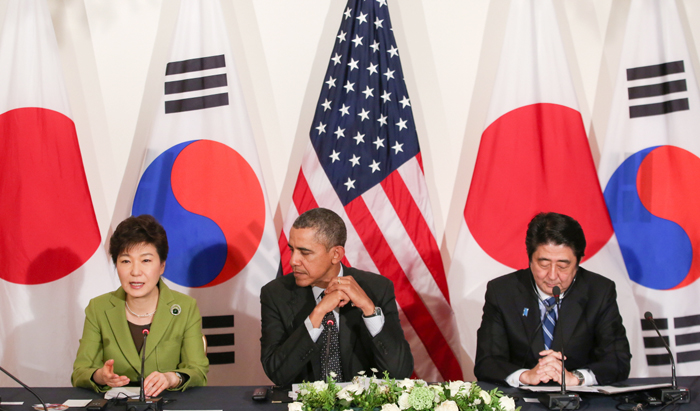
President Park Geun-hye (left) speaks during the trilateral talks with U.S. President Barack Obama and Japanese Prime Minister Shinzo Abe (right) on the sidelines of the 3rd Nuclear Security Summit in The Hague, Netherlands, on March 25. (photo: Cheong Wa Dae)
“Our government will continue to take a principled approach toward humanitarian aid for North Korea and maintain keen interest in promoting nongovernmental interchanges through cultural and sports activities, and care for the most vulnerable North Korean children,” she added.
In addition, she stated that peace and security across Northeast Asia is vital to all the goals being discussed: to solving the North Korean nuclear issue; to making Pyongyang change course; and, lastly, to achieving unification of the two Koreas. In that sense, she stressed the importance of the U.S. “pivot” toward Asia, calling the strategy in line with her Northeast Asian peace initiative.
By Wi Tack-whan, Sohn JiAe
Korea.net Staff Writers
whan23@korea.kr
